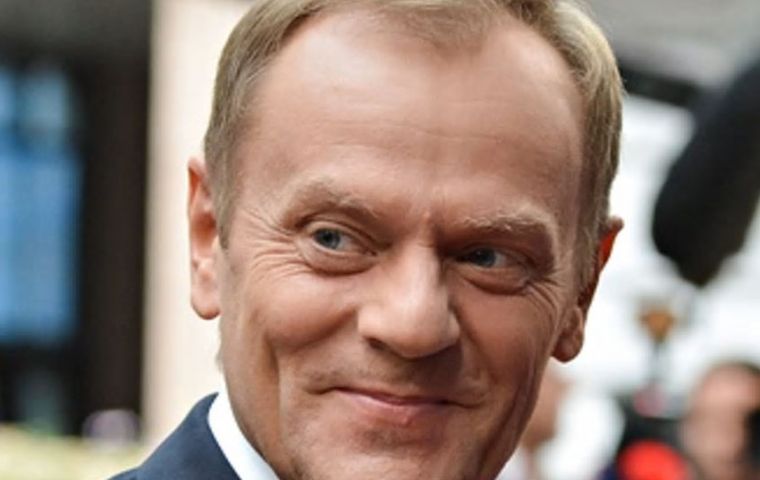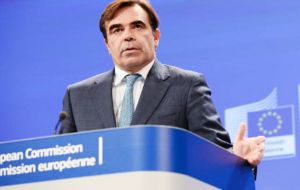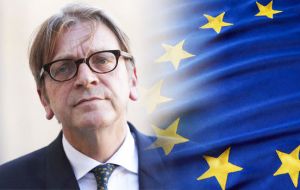MercoPress. South Atlantic News Agency
The snap election and consequences seen from the European Union
 Most official EU reactions were non-committal. European Council President Donald Tusk, indicated that they had a “good phone call”
Most official EU reactions were non-committal. European Council President Donald Tusk, indicated that they had a “good phone call”  EC spokesman Margaritis Schinas gave a dry response, “There are elections everywhere, that’s quite natural. Elections are good. We are in favour, in general”
EC spokesman Margaritis Schinas gave a dry response, “There are elections everywhere, that’s quite natural. Elections are good. We are in favour, in general”  European Parliament’s Brexit coordinator Guy Verhofstadt said that British voters would have the chance “to express on how they see the future UK/EU relationship”
European Parliament’s Brexit coordinator Guy Verhofstadt said that British voters would have the chance “to express on how they see the future UK/EU relationship”  Labour MEP Paul Brannen says the election only helps at the negotiating table in presentational terms: ”she can argue her positions has been endorsed by voters.”
Labour MEP Paul Brannen says the election only helps at the negotiating table in presentational terms: ”she can argue her positions has been endorsed by voters.” Prime Minister Theresa May announcement of a June snap election could strengthen her hand in the Brexit negotiations but the rest of the European Union was firm about its position in the two-year talks, insisting that their stance would be unchanged whatever the result.
However, there was optimism that the vote could change the tone of the British negotiations if Mrs. May increases her majority, as opinion polls indicate: she could then have more room to bargain with the EU27 on sensitive issues that would otherwise risk being hijacked.
Most official EU reactions were non-committal. European Council President Donald Tusk, who spoke with Mrs. May, indicated that they had a “good phone call”, but also issued a cryptic movie tweet, that, “It was Hitchcock, who directed Brexit: first an earthquake and the tension rises.”
Mr. Tusk’s spokesman said the EU27’s Brexit plans remain unchanged. European Commission spokesman Margaritis Schinas gave a dry response, “There are elections everywhere, that’s quite natural. Elections are good. We are in favour, in general,” he said.
The European Parliament’s Brexit coordinator Guy Verhofstadt said that while the election “is an internal affair” it would give British voters the chance “to express themselves on how they see the future relationship between their country and the EU.”
However Labour MEP Paul Brannen says any change in the power balance would be purely on the British side. “Some in the government may feel it strengthens their hand with these ghastly foreigners,” he said. “But the only way this helps her at the negotiating table is in presentational terms: she can say that her positions has been endorsed by voters.”
“If May returns with much bigger majority, this could soften her stance in the negotiations,” says Giles Merritt, who heads the influential Brussels think-tank, Friends of Europe. “She doesn’t want a car crash. She wants to get a deal at the end of the two years. It’ll give her room to manoeuvre. She’ll be able to say that she has the whole country behind her.”
Agata Gostynska-Jakubowska, a research fellow at the London-based Centre for European Reform says it could help Mrs May in the talks over the transitional period after Brexit. “This is a tricky issue, because the transition would probably mean continued jurisdiction of the European Court of Justice, and continued payments to the EU.”
The election will barely affect the Brexit timetable, as the next few weeks are already blocked by internal EU27 preparations. A summit of the EU27’s national leaders is scheduled in Brussels on April 29, where they are due to agree negotiating guidelines.
On May 22, governments should agree the directives for EU chief negotiator Michel Barnier to launch the formal talks. Mr Barnier already indicated that he only expected full negotiations to start in early June.
Likewise the EU is already in the throes of a particularly heavy election year: Dutch voters went to the polls last month, France votes for a new president on Sunday and a new parliament in June, and Germany’s federal elections are in September.




Top Comments
Disclaimer & comment rulesCommenting for this story is now closed.
If you have a Facebook account, become a fan and comment on our Facebook Page!